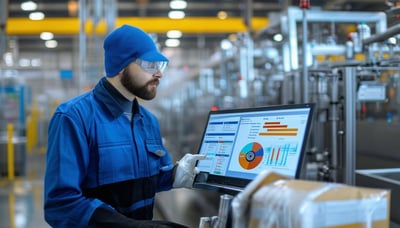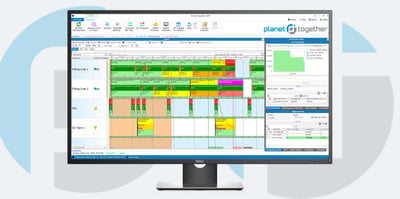Harnessing AI for Predictive Scheduling
As a Supply Chain Manager, you understand the intricate balance between meeting customer demands, optimizing resources, and ensuring smooth operations. In this digital era, leveraging the power of Artificial Intelligence (AI) for predictive scheduling can revolutionize your packaging manufacturing facility's efficiency and competitiveness.
In this blog, we look into the transformative potential of AI-driven predictive scheduling, exploring its benefits, challenges, and the integration between advanced planning and scheduling (APS) tools like PlanetTogether and leading Enterprise Resource Planning (ERP), Supply Chain Management (SCM), and Manufacturing Execution Systems (MES) such as SAP, Oracle, Microsoft, Kinaxis, and Aveva.

Predictive Scheduling
Predictive scheduling involves forecasting future production requirements, resource availability, and potential bottlenecks to optimize scheduling decisions. Traditional scheduling methods often rely on historical data and manual intervention, leading to suboptimal outcomes in the face of evolving market dynamics.
AI-powered predictive scheduling, on the other hand, leverages machine learning algorithms to analyze vast datasets, identify patterns, and anticipate future trends with unprecedented accuracy. By integrating real-time data from various sources, including ERP, SCM, MES systems, and external factors like market demand and supplier performance, AI empowers manufacturers to proactively adjust schedules, allocate resources efficiently, and minimize disruptions.

Benefits of AI for Predictive Scheduling
Enhanced Operational Efficiency
-
- AI-driven predictive scheduling enables agile decision-making by providing real-time insights into production processes, resource utilization, and potential constraints.
- By optimizing production schedules based on demand forecasts and resource availability, manufacturers can minimize idle time, reduce lead times, and maximize throughput.
- Integration with ERP, SCM, and MES systems ensures seamless communication and alignment across the supply chain, enabling synchronized production planning and execution.
Improved Resource Utilization
- Predictive scheduling helps identify underutilized resources and bottlenecks in advance, allowing managers to allocate resources effectively and prevent overcapacity or shortages.
- By optimizing machine utilization, labor allocation, and material flow, manufacturers can reduce costs, increase productivity, and maintain competitive pricing.
Enhanced Customer Satisfaction
- AI-driven predictive scheduling enables manufacturers to meet customer demands more accurately and consistently by ensuring timely delivery of products.
- By proactively identifying potential delays or production issues, manufacturers can mitigate risks and maintain high service levels, enhancing customer satisfaction and loyalty.
Data-Driven Decision Making
- Leveraging AI for predictive scheduling empowers managers with actionable insights derived from vast amounts of data.
- By analyzing historical performance, market trends, and real-time data, manufacturers can make informed decisions to optimize production schedules, anticipate demand fluctuations, and adapt to changing market conditions.
Challenges and Considerations
While the benefits of AI-driven predictive scheduling are compelling, implementation comes with its challenges and considerations:
Data Quality and Integration
-
- Effective predictive scheduling relies on accurate and timely data from various sources, including ERP, SCM, and MES systems.
- Ensuring data quality, consistency, and compatibility across different platforms is essential for seamless integration and reliable forecasting.
Change Management
- Adopting AI-driven predictive scheduling requires organizational buy-in and cultural shifts to embrace data-driven decision-making processes.
- Providing adequate training and support to employees and stakeholders is crucial to facilitate the transition and maximize the benefits of the new system.
Scalability and Flexibility
- Packaging manufacturing facilities operate in dynamic environments with evolving customer demands and market trends.
- AI-driven predictive scheduling solutions must be scalable and flexible to accommodate changing requirements and accommodate growth without compromising performance.

Integration with PlanetTogether and Leading ERP, SCM, and MES Systems
The integration between PlanetTogether, a leading APS solution, and prominent ERP, SCM, and MES systems such as SAP, Oracle, Microsoft, Kinaxis, and Aveva offers a comprehensive solution for predictive scheduling in packaging manufacturing.
Seamless Data Exchange
-
- Integrating PlanetTogether with ERP, SCM, and MES systems enables seamless data exchange, ensuring a single source of truth for production planning and execution.
- Real-time synchronization of data allows for dynamic adjustments to production schedules based on changing demand, resource availability, and market conditions.
Advanced Analytics and Optimization
- By combining the predictive capabilities of PlanetTogether with the data analytics and optimization features of leading ERP, SCM, and MES systems, manufacturers can achieve unprecedented levels of efficiency and agility.
- Advanced algorithms analyze historical data, forecast demand, and optimize production schedules to maximize throughput, minimize costs, and enhance customer satisfaction.
End-to-End Visibility and Control
- Integration between APS and ERP, SCM, and MES systems provides end-to-end visibility and control over the entire supply chain, from raw material procurement to finished product delivery.
- Managers can monitor production progress, track resource utilization, and proactively identify and address potential issues to ensure smooth operations and timely delivery.
AI-driven predictive scheduling holds immense potential for transforming packaging manufacturing operations, enabling organizations to achieve higher efficiency, agility, and customer satisfaction. By integrating advanced planning and scheduling tools like PlanetTogether with leading ERP, SCM, and MES systems, manufacturers can harness the power of AI to optimize production schedules, allocate resources effectively, and adapt to changing market dynamics.
As a Supply Chain Manager, embracing AI for predictive scheduling is not just a technological advancement but a strategic imperative to stay ahead in today's competitive landscape. By leveraging data-driven insights and advanced analytics, you can unlock new opportunities for operational excellence and drive sustainable growth in your packaging manufacturing facility.
Are you ready to take your manufacturing operations to the next level? Contact us today to learn more about how PlanetTogether can help you achieve your goals and drive success in your industry.